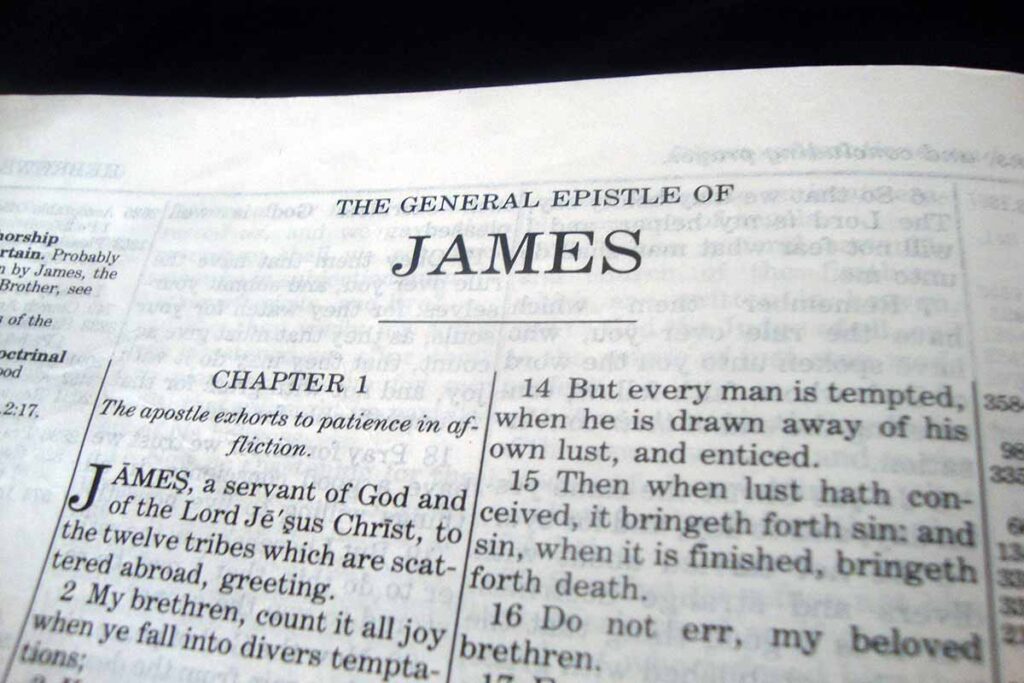The Book of James
James wrote to Jewish Christians who had been scattered throughout the Mediterranean world because of persecution. In their hostile surroundings, they were tempted to let intellectual agreement pass for the true faith. This letter can have rich meaning for us as we are reminded that genuine faith transforms lives. We are encouraged to put our faith into action. It is easy to say we have faith, but true faith will produce loving actions toward others.
By showing the believer’s place in God’s kingdom, James addresses the believer’s responsibility before God’s law. James’ blunt and forthright manner is a powerful tempering agent for those who may see God’s grace as an excuse for carnal indulgence or sin.
Genuine faith will inevitably produce good deeds. This is the central theme of James‘s letter, around which he supplies practical advice on living the Christian life.
This letter could be considered a how-to book on Christian living. Confrontation, challenge, and a call to commitment await you in its pages. Read James and become a doer of the Word.
Writer of James
Written by the Apostle James, “a servant of God and of the Lord Jesus Christ” (James 1:1). The name in Greek was Iakobos (Jacobus/Jacob). But was translated as “James” in the KJV and other early English translations. This James was identified as “the Lord’s Brother” (Galatians 1:19). A leader in the Jerusalem church, written from Jerusalem.
Date Written
During the Great Scattering described in Acts 8-12 (A. D. 40s). Probably around A. D. 49, prior to the Jerusalem council held in A. D. 50
To Whom Written
To the leaders (ekklesias – out-positioned) of the “twelve tribes which are scattered abroad.” First Century Jewish Christians residing in Gentile communities outside Palestine, and all Christians everywhere.
Purpose of James
The purpose of the Epistle was to address the leaders (ekklesias) of those who are scattered during the Great Scattering, the second period of Acts, following the Great Unity. It was written to deal with issues that the believers were facing, such as personal trials of faith, the conflict between rich and poor, and the hypocrisy of those who said they had faith and yet did not act upon it.
The letter is primarily practical and ethical, emphasizing duty rather than doctrine. The author wrote to rebuke the shameful neglect of certain Christian duties. In doing so, he analyzed the nature of genuine faith and urged his readers to demonstrate the validity of their experience with Christ. His supreme concern was reality in religion, and he set forth practical claims of the gospel.
Historical Setting of James
James addressed the epistle to “the twelve tribes which are scattered abroad.” This implies a readership of Jewish Christians living outside Palestine. Elsewhere in the epistle, however, James refers to hired field labor, and this locates his audience inside Palestine. In James’ day only in Palestine did farmers employ hired rather than slave labor, as was customary elsewhere.
Theological Contribution
The Epistle is a sturdy, compact letter on practical religion. For James, the acid test of true religion is in the doing rather than the hearing, “believing,” or speaking. In this respect, the Epistle echoes clearly the ethical teaching of Jesus, especially as it is recorded in the Sermon on the Mount.
Special Consideration
Some Bible scholars suggest that James and Paul differ in their views on the saving significance of faith and works. Paul states, “A man is justified by faith apart from the deeds of the law” (Romans 3:28), and James says, “A man is justified by works, and not by faith only” (James 2:19). A closer reading of the two, however, reveals that they differ more in their definition of faith than in its essence. James writes to readers who are inclined to interpret faith as mere intellectual acknowledgment. As a consequence, he stresses that a faith which does not affect life is not saving faith; hence, his emphasis on works. Actually, faith is entrusting of one’s whole life to God through Christ, with the result that one’s life becomes renewed with the “fruit of the Spirit” (Galatians 5:22)
Recommended Bible Study Resources
ESV Study Bible – Study Bibles give you a deeper understanding of God’s Word with tools for life application like commentary, maps, charts, concordance, and study notes. Search our popular translations- NIV, ESV, NKJV, KJV and more!
Believer’s Bible Commentary: Second Edition – A Bible commentary is a written, systematic series of explanations and interpretations of Scripture. Commentaries often analyze or expound on individual books of the Bible, chapter by chapter and verse by verse. Some commentary works provide analysis of the whole of Scripture.
The New Strong’s Expanded Exhaustive Concordance of the Bible – The best concordance for word study! This exclusive new edition of a legendary classic puts generations of biblical research at your fingertips. A valuable tool for pastors, teachers, and students of the Bible.
Vine’s Complete Expository Dictionary of Old and New Testament Words – This classic word study resource allows you to study the meaning of biblical words in the original languages without spending years learning Greek or Hebrew. A great resource for students, seasoned pastors, and anyone who enjoys biblical word studies–even if they have little to no formal training in Hebrew or Greek.
Halley’s Bible Handbook – The beloved and classic Bible companion has been thoroughly updated, while retaining its time-honored features and Dr. Halley’s highly personal style, to offer even greater clarity, insight, and usefulness.






